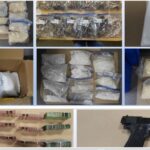B.C. introduces Canada's toughest impaired laws
The province is introducing Canada’s most immediate and severe impaired driving penalties to save lives, curb repeat offenders and give police more enforcement tools, Solicitor General Michael de Jong, QC, announced today.
“Despite increased enforcement and significant efforts to promote awareness, we’ve begun to see a rise in impaired driving across British Columbia,” said de Jong. “That trend is unacceptable and that’s why we’re bringing in these new
laws: to get impaired drivers off the road with clear, swift and severe penalties.”
In memory of Alexa Middelaer, de Jong also announced a provincial goal: to reduce alcohol-impaired driving fatalities by 35 per cent by the end of 2013.
Middelaer was four when she was killed by an alleged drunk driver in Delta two
years ago.
Under changes to the Motor Vehicle Act (MVA), drivers who provide a failing
breath sample above 0.08 per cent BAC or refuse to provide a breath sample at
the roadside will face an immediate, 90-day driving ban and a $500 fine. As
well, they will have their vehicle impounded for 30 days. They may also face
criminal charges.
Drivers caught once in the “warn” range (between 0.05 and 0.08 per cent BAC) in a five-year period will face an immediate, three-day driving ban and a $200
fine; a second time, a seven-day ban and a $300 fine; and a third, a 30-day ban
and a $400 fine. Research shows that driving with a BAC in that range means a
driver is seven times more likely to be in a fatal crash than if they have no
alcohol in their body.
In addition, drivers who blow once in the “fail” range, or three times within
five years in the “warn” range, will be required to participate in the rehabilitative Responsible Driver Program. They must also use an ignition interlock device, which tests a driver’s breath for alcohol every time they operate their vehicle, for one year.
“B.C.’s measures target impaired drivers more effectively than any Canadian
jurisdiction has to date,” said Andrew Murie, CEO of Mothers Against Drunk
Driving Canada. “We believe these major, escalating penalties will better support both deterrence and enforcement, save lives and prevent hundreds of
injuries each year on B.C.’s roads. We encourage other provinces to study what
B.C. is doing and follow its example.”
The new, roadside-issued, 90-day bans mean officers will no longer need to take drivers to the station for a full breath analysis in order to impose a driving
ban longer than 24 hours.
“We believe that this new initiative will help all law enforcement officers to
apprehend and reduce the number of impaired drivers in our province,” said
Insp. Mike Diack of the RCMP’s B.C. Traffic Services. “There are people killed
on B.C. highways each year as a direct result of impaired drivers. With additional enforcement powers, our police officers will be better equipped to reduce those casualties. Harm reduction is our number-one priority.”
The changes to B.C.’s impaired driving laws are expected to come into effect in
fall 2010. More information on the changes is available at www.pssg.gov.bc.ca/osmv/ online.
Details of other changes to the MVA introduced today that relate to motorcycle
safety, driver fitness and driver’s licences for agricultural workers are highlighted in an information bulletin at http://www2.news.gov.bc.ca/news_releases_2009-2013/2010PSSG0025-000470.htm.


























Comments